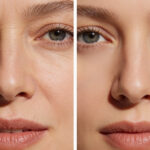An Unseen Threat in the Modern World
Digital screens like computers, tablets, and phones have become an integral part of our lives. However, the blue light (HEV – High Energy Visible Light) It affects not only our eyes but also our skin. In this article, we will examine the potential effects of blue light on the skin from a scientific perspective.
What is Blue Light?
Blue light is a light spectrum found in the visible light spectrum high energy, short wavelength (380–500 nm) It is a light that has a natural origin. It is found naturally in sunlight. However, nowadays blue light emitted from artificial sources We are also much more exposed to:
- Smartphones
- Computer screens
- LED televisions
- Tablets and smartwatches
The Scientific Relationship Between Blue Light and Skin
Recent studies have revealed that blue light may have the following effects on the skin:
📉 May Decrease Collagen Production
It's thought that blue light can cause molecular changes in the skin that suppress collagen production. This can lead to loss of skin elasticity and the appearance of fine lines in the long term.
🌫️ May Cause Hyperpigmentation
Some scientific data, especially darker skin typesStudies show that long-term exposure to blue light can cause skin tone imbalances (blotchiness, unevenness).
🔥 Increased Oxidative Stress
Blue light can increase the production of free radicals in skin cells. This triggers a process called "oxidative stress," which can increase cellular damage. While oxidative stress is a natural part of the aging process, excessive exposure can accelerate the process.
What is Digital Skin Aging?
Digital agingIt's a modern term used to describe the changes that long-term exposure to blue light and screens can cause in the skin. The main symptoms that can be observed during this process are:
- Dull and matte skin appearance
- Visible lines around the eyes
- Skin tone inequalities
- Feeling of dryness
Other Screen Habits That Affect Our Skin
Beyond blue light, looking at screens for long periods of time can also indirectly affect skin health:
- Sleep patterns may be disrupted → This negatively affects skin regeneration at night.
- Stress levels may increase → Cortisol hormone can weaken the skin barrier.
- Physical inactivity → Blood circulation may slow down, reducing oxygen transport to the skin.
What Does This Information Mean?
The information shared in this article is not intended as medical diagnosis or treatment. However, scientific research on blue light reveals that skin health can be affected not only by the sun but also by technological environments.
Being informed is a step toward becoming more conscious of our daily habits. If you're experiencing any skin concerns, it's recommended that you consult a dermatologist.
Invisible Light, Visible Effects
Nowadays, screen time is increasing. The effects of blue light on the skin are an important topic that the scientific world is still researching. Taking good care of your skin isn't just about creams. with lifestyle awareness is also possible.
📌 Notes:
This blog post is for general informational purposes only. It does not constitute a diagnosis, treatment, or product recommendation. It's important to seek professional medical advice for any questions about your skin health.








